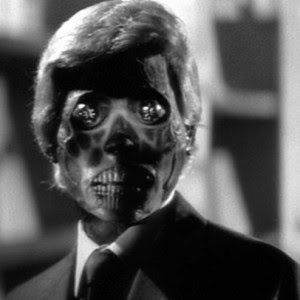Genre: Sci-Fi
Premise: A medical salesman receives a mysterious pre-recorded message from his younger self detailing an unimaginable impending horror.
About: Lionsgate bought this spec last year from “Lost” scribe Craig Rosenberg, which he was originally set to direct. But now “The Haunting In Connecticut” helmer, Peter Cornwell, has taken the reigns. Rosenberg has directed two movies of his own (“Hotel de Love” and “Half Light”), written two others (“The Uninvited” and “After The Sunset”) and landed an additional feature writing job after the sale of Panopticon for Universal and Don Murphy titled, “Second Sight,” about a detective who hides the fact that he’s going blind while working on a puzzling murder case.
Writer: Craig Rosenberg
Details: 114 pages (undated)
Gotta love the Reader Faves Voting! Staring down at my “to-read” list is often a daunting task. So many unknowns. So much risk with each script opened. I hate reading bad scripts. I hate writing negative reviews. It’s so much better when ten people tell me “read this!” so I actually know a script’s halfway decent. Which is how The Panopticon ended up on my radar.
And I’m glad you alerted me to it, because it’s well-documented this genre plays on a 24 hour repeating cycle in the Reeves household. And if you’re into sci-fi thrillers like “Umbra,” “Karma Coalition,” “Signals,” and “Passengers,” it probably takes up a healthy dose of your viewing time as well. But if you aren’t up for a little ridiculous logic, a few leaps of faith, and a plot hole or two, I wouldn’t bother even transferring this to your brand new Ipad. Cause at times The Panopticon is as silly as it is awesome. Touch screen at your own risk.
 Peter Burke is a highly intelligent but otherwise ordinary guy who sells medical equipment for a run-of-the-mill sales company. He’s smart, and could definitely do better, but for whatever reason, Peter’s satisfied with where he’s at, living the simple life. He’s got a super-hot girlfriend, Lisa, who works for a large corporation, and who’d like to see him take advantage of that magnificent brain of his. But he remains insistent. He likes the no-frills lifestyle. He wants to keep it simple.
Peter Burke is a highly intelligent but otherwise ordinary guy who sells medical equipment for a run-of-the-mill sales company. He’s smart, and could definitely do better, but for whatever reason, Peter’s satisfied with where he’s at, living the simple life. He’s got a super-hot girlfriend, Lisa, who works for a large corporation, and who’d like to see him take advantage of that magnificent brain of his. But he remains insistent. He likes the no-frills lifestyle. He wants to keep it simple.
And then Peter gets a package. He opens it up, finds a DVD, hesitantly puts it in, and presses play. He’s terrified to see that the DVD is of him, five years ago. He looks gaunt, and appears to be in some sort of medical facility. Peter informs him that he’s not really Peter. His name is Nick. That the end of humanity is near. And that he’s the only person who can save the world.
Yikes. Things just turned decidedly un-simple.
Naturally Peter (Nick?) is kind of freaked out about this whole thing. Grabs a canoe, jumps in da Nile, figures he’ll head home and sleep it off. But oh look! His apartment is ransacked (I’m pretty sure in every one of the scripts I listed above, there’s an apartment ransacking scene – future writers may want to avoid this to stay original). And, uh oh, there are angry men with guns at the door (ditto on men with guns post-ransacking). Peter acutely speculates these men are here to kill him and does the window jump. He somehow gets to Lisa’s work where he takes her along for the ride. But men with guns are always good at finding fleeing protagonists. And they make no exceptions here. Just when it looks like they’re surrounded and all sorts of dead, a van spins up to block the shooters and two men pull Peter and Lisa to safety, escaping the blanket of bullets just in time.
David Rohacek claims to be a scientist. He’s accompanied by a mysterious man Peter remembers seeing at Starbucks. We’ll know him throughout the script as “Starbucks Guy.” These men inform Peter that the time has come. The aliens are about to take over earth, and he’s the only one who can save them. Although Peter’s been playing the surprised card all this time, turns out he might know a little more about that message from himself than he let on. See, Peter used to be a defense bio-chemist, the pinnacle of his work being a super plague that could wipe out humanity within a few days. But during the testing process, one of the blood samples he was provided with showed some characteristics that could only have been…alien in nature. Peter blabbed his concerns to his bosses, who immediately deemed him a nutcase and carted him off to the Happy House. Once there, Peter found that the other patients weren’t patients at all, but others who had stumbled onto this alien secret. The government, probably run by these aliens, was clearly keeping them here so they couldn’t expose this secret to the world.
The only way out was some major rehabilitation with high-octane psychiatric drugs. The “doctors” needed to convince them that there were no aliens, and that it was all a psychosomatic delusion. The members anticipated their eventual brainwashing, and encouraged Peter to make a tape for his later “cured” self, so he would remember the truth. This is, of course, the tape he received. Peter, who has the ability to create a mass plague which targets only the alien blood, is the only one who can save mankind. That is why he’s been rescued by these two, so they can take him back to their makeshift lab, and he can build and unleash the plague before the bad guys kill him.

The question, of course, is “Is any of this real?” Did Peter really discover an alien blood sample? Were the other patients really rounded up by the government? Could he just be manifesting all this to deal with some psychosomatic complex? As decision time grows near, the answer to this question will have devastating consequences for billions of people, all dependent on a choice Peter must make. Is he sane or not?
The cool thing about The Panopticon is that it separates itself from every other spec within the first five pages. The story is told mainly from the point of view of…you! Because YOU are Peter Burke. So when Rosenberg writes, he’s saying things like, “You go over and hug your girlfriend. She’s hot. Damn you’re lucky…Afterwards you go to grab a piece of toast. You burn your fingers. Oww.” I know this sounds cheap and traditionalists are already rolling their eyes. And I admit, when done wrong, this shit is amateur. But Rosenberg nails it and within two lines I was so used to it, I actually preferred it. It made everything feel so personal. Hey, *I* was the hero. That’s pretty cool. — I also wondered if this was just a writing choice, of if the movie will be shot from our point-of-view. Like a first person video game. I remember this being attempted a long time ago in an independent film. I never saw the film but always thought it would be a unique way to tell a story. Is that what they plan to do here? No idea, but it would definitely be wild if they went that route.
I also love how the script plays with whether you (“Peter”) are crazy or not. We see evidence for both possibilities, and Rosenberg expertly shifts that evidence in and out of your favor throughout the story. Sometimes you’re positive you’re crazy. But then a scene occurs that 100% convinces you you’re not. Then ten pages later, you’re doubting your sanity again. By the time the climax hits, we really have no fucking clue one way or the other. And it’s that uncertainty that leads us to one of the better thriller endings I’ve read in awhile. (minor ending spoilers here) In fact, I was going to give this a simple “worth the read,” right up before the last three pages. But then a big twist comes, and it’s one of those endings that makes you go, “Fuck,” because you can’t believe you didn’t see it coming. But you smile because it worked. That made this a “double worth the read” right away.
The only problems are the aforementioned plot holes and implausibilities. I think everybody has their genre where they allow the writers to play hard and fast with the rules, and this is mine. I didn’t mind the plot holes in Karma Coalition. And I didn’t mind them here. Why? Because there’s a certain kind of fun absurdity to it all that shuts down my logic-checking circuits. Logic-checking circuits? What am I, a droid now? Am I taking over the world?
Nah, that would be Steve Jobs. That damn Ipad is everywhere. And strangely, I want one.
The Panopticon is a cool thriller written with a unique style that separates it from the glut of scripts piling up on executives’ desks. If you like this type of story or you want to know how this separated itself from the pack, check it out.
Script link: The aliens took it.
[ ] What the hell did I just read?
[ ] wasn’t for me
[xx] worth the read
[ ] impressive
[ ] genius
What I learned: Make sure your writing style is a natural extension of your story’s tone. Rosenberg has a lot of fun with character names here. For example, Peter’s co-workers are named “Fat Guy Passing Time,” and “Divorcee Trying To Make Ends Meet.” This works because the tone of the script is fun, intense, bordering on absurd. But you probably wouldn’t do this in a script like, “The Hurt Locker.” The writing’s going to be more serious, more literal, more reflective of the tone. I bring this up because I’ll often see young writers using a really flashy and crazy style when they’re writing something like, “Up In The Air.” If you’re writing a crazy script like “Repo Men,” your style should be crazy. If you’re writing something traditional like, “Remember Me,” your writing style should be traditional. If you’re writing something like “The Hangover,” your writing style should be funny.

